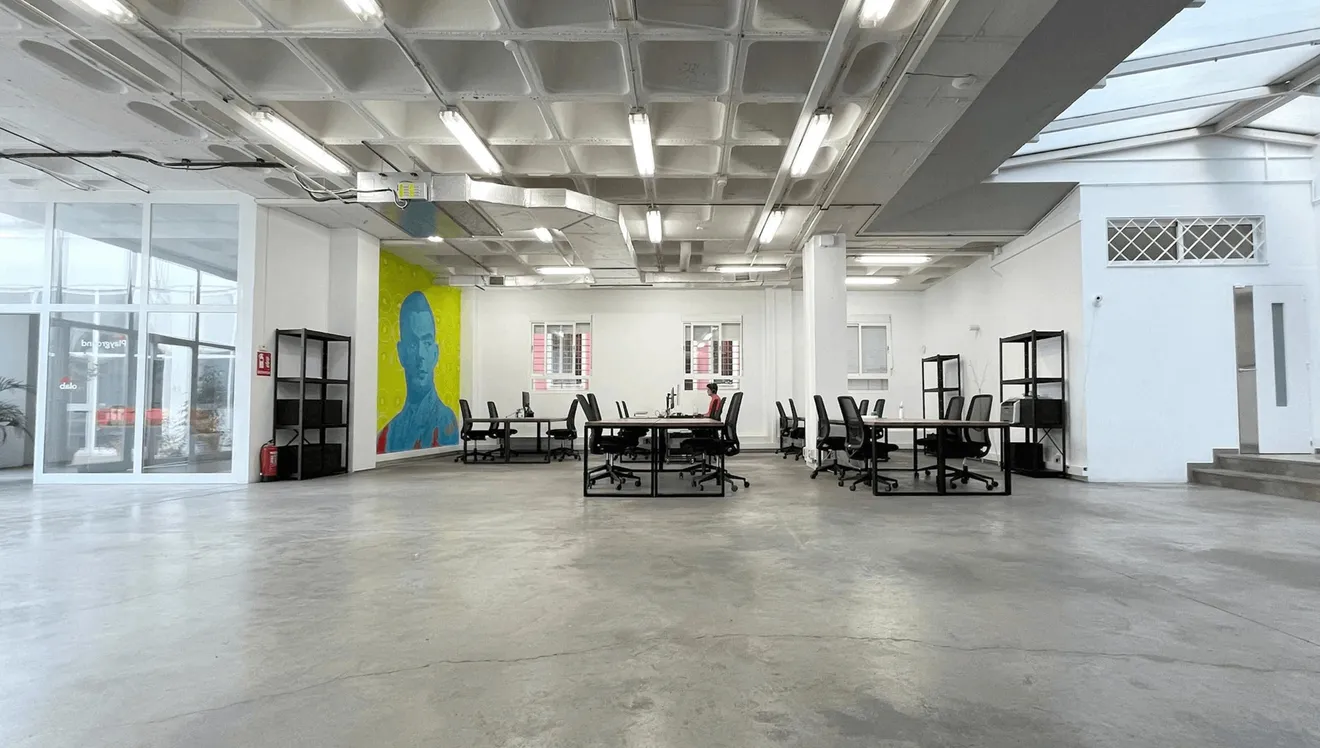While other companies take a remote-friendly approach, which means their employees have the flexibility to work from home now and then, Z1 has always been remote-first. In fact, 35% of Z1’s workforce worked remotely before COVID-19, making the transition to full remote working due to the crisis much easier.
We’d like to pass on a little of what we’ve learned about building a productive, inclusive, and convivial work culture with a distributed team. We hope it helps in these challenging times as everyone adjusts to a new working reality — at least for a while.
A slice of remote life at Z1
Z1 team members are posting pictures of their home workspaces on Slack. It’s a few days before government measures were taken in Spain to prevent the spread of COVID-19, and Z1 has already made the transition to working fully remotely.

In her picture, Michelle, Z1’s Head of Partnerships, looks out from her home office at the snow-capped mountains of Vancouver, Canada.
- "Look Manuela!! Michelle has babuchas too 🧦,” laughs Seville-based Marta, on noticing Michelle’s slippers visible in the photo.
- “You see! If Michelle wears them they are trendy 💁”. Manuela, also in Sevilla, soon joins the slipper admiration.
- “I live in these slippers” admits Michelle.
- “So comfy 😊” says Marta.
More pictures appear on the thread from employees around Europe and North America. Some show Z1 employees working on laptops as their kids do school-work at the same table. Another shows a work desk sitting like an island in a sea of toys. One of the most-liked photos simply shows a thermometer on a desk, captioned “coronakit.”
Adi, in New York, posts pictures of various views of his home office. The final one is of a drinks cart.
- “More importantly, the view behind me when times get tough.”
- “I feel you 😂” responds Gabriel from Sevilla.
The camaraderie is a product of our commitment to a culture that makes all employees feel valued — no matter where they live and work.
The easy camaraderie of these Slack communications is a product of our commitment to a culture that makes all employees feel valued and empowered — no matter where they live and work.
Remote working is in our DNA
“When we founded Z1, we did it already working remotely” says Carlos, COO and founding partner. “It’s something we’ve had in our DNA from day one.”
Our aim is to find the best talent, wherever they live. All Z1 team members are full-time, fully immersed in our culture and practices. Remote working, for us, doesn’t mean outsourcing, or what some think of as “offshoring.”
Z1’s delivery team HQ is in Sevilla, with some team members working remotely around Spain. We have product managers in New York, while our parent company and head of partnerships is in Canada. Our client list spans the US, Canada, and the UK.
Our culture is not just remote-first, it’s results-first. A distributed organization needs to be an outcome-driven organization.
Michelle, Z1’s Head of Partnerships, had worked alongside the Z1 team for nearly a year before finally travelling from Vancouver to meet her team mates face-to-face at the HQ in Seville. “From abroad, I try to share of myself first to offer my workmates a digital lens into my daily life, my family, my interests,” she says. “Upon arrival in Spain, I was already stepping into friendships.”
Our culture is not just remote-first, it’s results-first. “Working in a different timezone can feel like wasting time or earning time depending on the time difference,” says Héctor, CEO and founding partner. “A distributed organization needs to be an outcome-driven organization.”

Remote working provides the flexibility for Z1’s team members to adapt their own workstyle and schedule to deliver great outcomes. More than simply being at home, employees are encouraged to take a higher degree of ownership in their work wherever they are.
“As in all aspects, there will be people who fit into remote work more quickly than others,” says Emilio, Z1's CTO. “But with will and time, it is possible to achieve dynamics that work. Dynamics that will eventually become part of the company culture.”
The rise of remote working
The recent crisis means millions more people in Spain, the US, and around the world are now working from home out of necessity. However, remote working has been on the rise for some time.
We Work Remotely, an online job board for remote positions, has analyzed their own data. They saw remote job postings rise from a few hundred in 2013 to over 3,000 jobs in 2019. The number of remote-first companies with no physical HQ also rose dramatically, from 2.5% in 2014 to 21.5% in 2019.
Matt Hollingsworth, Head of Operations at Tiny Boards Ltd (the company behind We Work Remotely), and host of The Remote Show podcast, acknowledges the difficulties faced by companies adopting remote working at short notice: “Companies are having a hard time right now, and managers are very scattered and overwhelmed with the idea of remote employees,” he says. “Be transparent, and do your best. We’re in this together, and we’ll get through it.”
Supporting clients across time zones
Because most of our clients are in North America, we’ve learned a few things from working across timezones. “Reachability is crucial,” points out Héctor. “Even when you can’t act because the team is not operating, it’s important to reply back and confirm you understand the tasks/issues, etc. The main goal has been always to provide that feeling of work done when our clients start their day,” adds.
“Although our people are separated by thousands of miles, we’ve built a productive partnership with Z1 by emphasizing clear, frequent, and responsive communication using digital collaboration,” shares Amardeep Manhas, CTO of Field Trip Health, a Z1 client with its head office in Toronto, Canada. “The result is that Z1 feels more like an extension of our team than a vendor.”
As the whole world turns to tools like Zoom, we have been relying on video calls to feel approachable and human for some time. A good process of weekly calls is important to establish a close relationship. Meanwhile, written communication is great for confirming notes and leaving asynchronous feedback and messages.
The main goal has been always to provide that feeling of work done when our clients start their day.”
Héctor Giner, Z1's CEO and Cofounder.
We like our clients to start their day feeling like we have completed some work. Daytime work hours are dedicated to internal collaboration and conversations, while we dedicate time to clients in the afternoons and evenings. “I think our clients value an outcome-based engagement,” says Michelle. “The people who love our team trust our process because we are consistently delivering beautiful, high-quality work.”
Our communication with clients involves smaller, more frequent, informal touch points to help create a feeling of sustained connection. We’ll favour a quick chat over Slack to validate small decision points, rather than a large and long meeting with big product reveals. “We always try to do the right thing, and have conversations with clients about product decisions like we are teammates working to grow the same business,” says Michelle. “Ultimately, we want to create a feeling of shared success.”
“In selecting a technology partner, it was critical for Field Trip to find a passionate team who is as excited to craft a delightful client experience as we are,” expresses Field Trip CTO Amardeep Manhas. “That is far more important than working in the same city or even time zone.”
Remote Leadership
The Z1 leadership team has been perfecting the art of building relationships and collaborating remotely for many years now. Here are some of their tips for managing remote teams successfully.
Héctor, CEO: Have empathy and share knowledge
- Empathy is key. Every manager in a distributed team has to learn to be empathetic to properly understand and support people to grow in terms of skills, autonomy, and purpose. Especially these days I recommend making sure the team members are doing well, fighting loneliness, encouraging teamwork, and ensuring that innovation continues to occur.
- Standardize as much as possible and always leave text notes after every conversation and decision-making process.
Carlos, COO: Trust your team and use the right tools
- Remote working is all about trust and self-management.
- Early on, we created Engine — a tool tailored to our needs. It houses reports on teamwork hours, projects, contracts, vacations everything in one place. We also use collaboration tools that help us work as if we are all together in the same space.
Emilio, CTO: Always communicate and stay secure
- Communicate a lot and give everyone access to what they need to do their jobs. Schedule regular follow-up meetings, use the tools you have to over communicate, leave comments, keep all documentation centralized and updated, take and share meeting notes...
- Use services that facilitate proper permission management and always keep up to date who can access what information. Store and share passwords in a secure way. When sharing passwords and access credentials between different team members, it is better to have them protected in a single place than sending them in a chat or email.
Michelle, Head of Partnerships: Build a strong culture
- Culture is formed around shared interests and values. I engage with the content my team shares, both on internal tools and on external social media channels. Our digital personalities can be so multifaceted with the platforms available to us.

Tips from experienced remote workers
Struggling with the transition to working remotely? We surveyed our team of experienced remote workers to provide some quick tips during this crisis:
- Set dedicated work hours and set windows of availability to clients and your team.
- Create a balance of work time and mental health time. Carve out time to listen to favourite podcasts, learn something new, or meditate.
- Set aside dedicated time for your family.
- Set long- and short-term productivity goals.
- Over communicate.
- Set realistic expectations with clients and team members.
- Create a physical space dedicated to work time.
- Take advantage of all the digital tools available to you, especially video.
- Cultivate good habits. A couple of books we recommend are Atomic Habits by James Clear and Tiny Habits by BJ Fogg.
- Create a culture and work environment based on trust.
👉 This Toptal Playbook is a superb guide that covers all areas of the remote work experience.
We also asked Matt Hollingsworth for some of his general rules that can help if people are having a hard time adjusting. He recommends the following:
- Get a routine. Get dressed for work, start at the same, take breaks and try to end at the same time as you normally would.
- Make sure your workspace has the things you need already: Stable wifi, a door you can close, headphones with a mic that works.
- Be transparent. The last thing you want to do is shut yourself off when you’re struggling. Let people know, talk to your manager and keep doing your best to make it work.
- Get some exercise in. Move your body.
If you are trying to get to grips with remote working, please get in touch. We’re happy to try to use our experience to help you out with some advice or tool recommendations.


